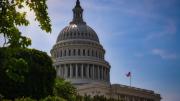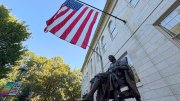On Thursday afternoon, House Judiciary Committee Chairman Jim Jordan issued a subpoena to Harvard to force the University to hand over documents pertaining to its financial aid practices, as part of a congressional probe into alleged tuition price-fixing in the Ivy League.
In a three-page letter accompanying the subpoena, addressed to President Alan M. Garber, Jordan accused Harvard of withholding materials that shed light on how the University sets tuition and awards financial aid.
Republicans on the House Judiciary Committee initially contacted Harvard, as well as the other seven Ivy League universities, on April 8, citing concerns about possible collusion to raise tuition prices, and asked the University to hand over internal documents related to a range of policies, such as legacy admissions and the use of algorithms in financial aid calculations. The committee also asked for documents related to its relationship with independent entities, including the College Board, the Common Application, and the 568 Presidents Group, a consortium of private universities with need-blind admissions that Harvard was not a member of.
Co-signed by Jordan and Congressman Scott Fitzgerald, who heads the House antitrust subcommittee, the June 26 letter accuses Ivy League schools of “collectively raising tuition prices while engaging in perfect price discrimination by offering selective financial aid packages to maximize profits.”
“Harvard’s response has been inadequate,” the letter continues, enumerating the University’s delays in producing the requested materials. Harvard, it alleges, has provided fewer than 400 documents, “among the lowest in volume of any Ivy League institution during this investigation.” So far, Harvard is the only university to have received a subpoena.
Harvard spokesperson Jason A. Newton called the committee’s decision to serve a subpoena “unwarranted, unfair, and unnecessary” in a statement. “There is no basis for an allegation of collusion in Harvard’s setting of tuition and financial aid,” he said.
Newton added that Harvard “has been responding in good faith to the Committee’s inquiry and has produced thousands of pages of documents regarding [its] tuition setting process and financial aid program.”
Among the reasons cited for serving the subpoena was the University’s failure to provide documents pertaining to the 568 Presidents Group, which was accused of implementing a common financial aid formula. In 2022, 17 universities in this group were sued over their failure to admit students on a need-blind basis; the group dissolved that year. According to the June 26 letter, Harvard’s attorneys had informed the committee that Harvard had decided not to join the group, but the University is still expected to produce documents or communications “related to that decision.”
Harvard’s tuition—at $86,926 for the 2025-2026 academic year, a 4.9-percent increase over the prior year—is lower than many of its peers’. In March, the University announced it would expand its financial aid offerings: undergraduates with family incomes below $100,000 would now attend free of charge, while those with family incomes under $200,000 would not have to pay tuition.
The University is facing several congressional investigations, including over antisemitism on campus and its mishandling of student protests. In a statement in response to the subpoena, Judiciary Committee Ranking Member Jamie Raskin, a Democrat, accused his Republican colleagues of “using Congress’s investigative powers to enforce” President Donald Trump’s “Gangster State agenda.”
The subpoena comes days after reports of Harvard’s resumed negotiations with the Trump administration in the ongoing dispute concerning federal funding cuts, international student visas, and alleged civil rights violations. In addition, Harvard’s attorneys are scheduled to present their arguments challenging the administration’s decision to freeze more than $2.2 billion in funding before a federal judge on July 21—mere days after the subpoena’s July 17 deadline.









